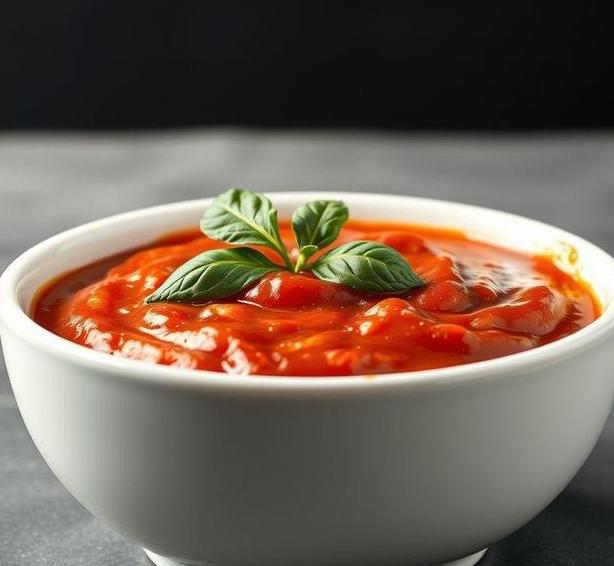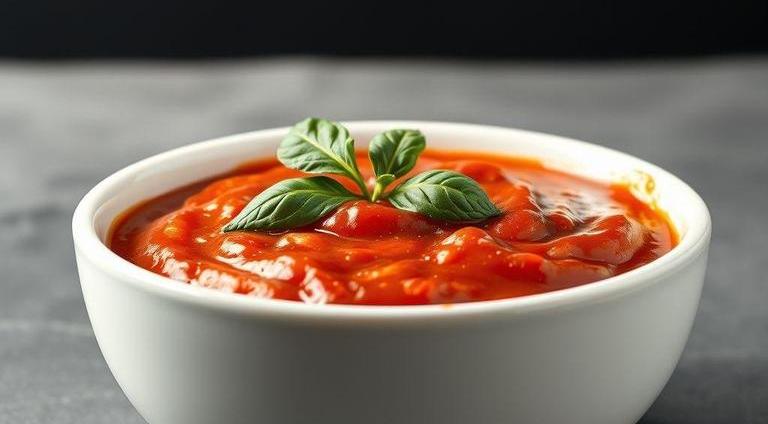Marinara sauce-this humble, flavorful staple is a kitchen essential for many. Whether you’re tossing it with pasta, spreading it on pizza, or using it as a dip for garlic bread, marinara has a knack for elevating dishes with its tangy, savory goodness. But have you ever found yourself staring at an open jar or homemade batch of marinara, wondering if it can actually go bad? Like many other foods, marinara sauce has a shelf life, and understanding how to store it properly and how to tell if it’s gone south is crucial for both safety and taste.
In this guide, we’ll take a deep dive into how long marinara sauce lasts, how to spot the signs that it’s past its prime, and the best ways to store it to maximize freshness. Whether you’re dealing with store-bought jars or homemade marinara, you’ll get all the information you need to enjoy this savory sauce safely.
Can Marinara Sauce Go Bad?
The short answer? Yes, marinara sauce can go bad-but it depends on a few factors. Marinara is typically made with simple ingredients like tomatoes, olive oil, garlic, herbs, and sometimes onions or red wine. These ingredients, especially tomatoes, are perishable. Even though the sauce is often preserved with acid (like vinegar or lemon juice) and salt, which can act as natural preservatives, marinara still has an expiration date.
Here’s why:
- Tomatoes are high in moisture: This creates an environment where bacteria can grow if not stored properly.
- Natural preservatives only go so far: Things like salt or acidity can slow spoilage, but they don’t make the sauce invincible.
- Exposure to air: Once opened, marinara sauce begins to degrade due to oxidation and bacterial contamination.
Shelf Life For Marinara Sauce

The shelf life of marinara sauce varies depending on whether it’s homemade or store-bought.
Store-Bought Marinara Sauce
- Unopened jar: Typically lasts 1-2 years past the “best by” date on the label. This is due to preservatives and vacuum-sealing techniques that prevent spoilage.
- Opened jar: Once opened, store-bought marinara sauce should last around 5-7 days in the fridge. However, check the label for specific guidelines, as different brands may have different shelf lives.
Homemade Marinara Sauce
- Unrefrigerated: Homemade marinara sauce should not be left at room temperature for more than 2 hours. After that, bacteria can start to grow.
- Refrigerated: Homemade marinara sauce can last around 4-5 days in the fridge. Since it doesn’t contain preservatives, it spoils quicker than store-bought versions.
- Frozen: If you want to keep it longer, freezing homemade marinara is a great option. It can last 3-4 months in the freezer. Just be sure to store it in an airtight container to avoid freezer burn.
Common Signs Of Spoilage
It’s important to know the signs of spoilage so that you don’t consume marinara sauce that’s gone bad. Fortunately, there are several indicators to look out for.
Change In Smell
- What to expect: Fresh marinara sauce has a zesty, fragrant tomato smell. If the sauce smells sour, musty, or rancid, it’s a clear sign that it’s spoiled.
- Why: Bacteria and yeast can cause fermentation, which leads to off smells. As tomatoes are naturally acidic, they don’t spoil as quickly as some other foods, but they’re still susceptible to bacterial contamination once exposed to air.
Mold
- What to expect: Mold can appear as fuzzy patches, typically white, green, or blue, on the surface of the sauce.
- Why: Mold thrives in moist environments, and the surface of marinara is a perfect place for it to grow if the sauce has been exposed to air. If you spot mold, discard the entire jar or container. Even if it’s just on the surface, mold can spread deeper into the sauce.
Separation And Change In Texture
- What to expect: While a little bit of oil separating from the sauce is normal, if you notice an excessive amount of liquid on top or the sauce appears too watery or lumpy, it may have gone bad.
- Why: Over time, marinara sauce can separate as water and oil break apart. This is common, but if the sauce has an off texture-clumpy, thin, or slimy-it’s time to toss it.
Off Taste
- What to expect: If the sauce tastes overly sour, bitter, or has any off flavors, it’s likely spoiled.
- Why: As marinara sauce spoils, the flavor compounds degrade, and the acidity can become too pronounced or unpleasant.
Swelling Jar
- What to expect: If a sealed jar is bulging or swollen, it may indicate bacterial contamination, often from botulism.
- Why: Botulism thrives in low-acid, anaerobic (airless) environments, and a sealed jar could trap bacteria and cause dangerous swelling. Never consume marinara sauce from a swollen jar.
How To Store Marinara Sauce?

Proper storage is key to prolonging the life of your marinara sauce, whether it’s homemade or store-bought. Here are some practical tips:
For Unopened Store-Bought Sauce
- Storage: Store in a cool, dry place (like a pantry or cupboard).
- Temperature: Keep the jar at room temperature and avoid storing it near heat sources or sunlight, as high temperatures can degrade the quality of the sauce and the seal on the jar.
For Opened Store-Bought Sauce
- Storage: After opening, refrigerate the sauce in an airtight container to minimize air exposure and slow spoilage.
- Temperature: Refrigeration is essential once the jar is opened, as this keeps the sauce fresh for up to a week.
For Homemade Marinara Sauce
- Storage: Allow the sauce to cool completely before transferring it into an airtight container or jar. Store it in the fridge for up to 4-5 days.
- Freezing: If you want to store it for a longer time, freeze the marinara sauce in a container or freezer-safe bag, leaving some room for expansion. You can freeze it in individual portions for easier defrosting later.
General Tips For All Sauces
- Avoid double-dipping: When you’re using marinara sauce, always use a clean spoon to prevent contamination.
- Check for leaks: If you’re using a container with a lid, make sure it’s tightly sealed to keep the sauce from spoiling quickly.
- Don’t leave it out: After using marinara sauce, don’t let it sit out for more than a couple of hours-especially on warm days. Always return it to the fridge promptly.
Expert Tips
Here are some expert tips to keep your marinara sauce at its best:
- Use smaller containers for leftovers: When storing marinara sauce in the fridge or freezer, consider splitting it into smaller portions. This helps you avoid having to defrost the entire batch each time you need a little bit.
- Don’t freeze in glass jars: Glass can crack under freezing temperatures. Instead, opt for plastic containers or freezer bags.
- Blanch the tomatoes: If you’re making homemade marinara, blanch your tomatoes before peeling them. This enhances the flavor of the sauce and makes it less prone to spoilage.
- Extend freshness with olive oil: Some people add a thin layer of olive oil over the top of marinara sauce before refrigerating it. The oil helps create a barrier that can preserve the freshness a little longer.
- Freeze in ice cube trays: For small, convenient portions, pour your homemade marinara into an ice cube tray. Once frozen, you can transfer the cubes into a bag, and you’ll have the perfect amount for individual servings.
FAQs
How Long Does Marinara Sauce Last?
Unopened marinara sauce can last for up to 1-2 years past the ’best by’ date when stored in a cool, dry place. Once opened, it should be consumed within 5-7 days if kept in the refrigerator.
Can Marinara Sauce Go Bad If Left Out?
Yes, marinara sauce can go bad if left out at room temperature for more than 2 hours, as bacteria can grow rapidly in perishable foods left out for too long.
How Can You Tell If Marinara Sauce Has Gone Bad?
Signs that marinara sauce has gone bad include an off smell, mold growth, or changes in color or texture. A sour or fermented odor indicates it has spoiled.
Does Marinara Sauce Need To Be Refrigerated?
Yes, once opened, marinara sauce should be refrigerated to maintain its freshness and prevent bacterial growth. Unopened jars can be stored at room temperature until they are opened.
Can Marinara Sauce Spoil After Being Opened But Refrigerated?
Yes, even refrigerated marinara sauce can spoil over time. It generally lasts about 5-7 days in the fridge, but this can vary depending on the ingredients and the way it was handled.
Can Mold Grow On Marinara Sauce?
Yes, mold can develop on marinara sauce if it is not stored properly, particularly if it is left exposed to air or stored for too long. Any mold growth means the sauce should be discarded.
Is It Safe To Eat Marinara Sauce Past Its Expiration Date?
Eating marinara sauce past its expiration date is not recommended, but if it’s unopened and stored correctly, it might still be safe. However, if it has been opened or shows signs of spoilage, it should not be consumed.
Can I Freeze Marinara Sauce To Extend Its Shelf Life?
Yes, marinara sauce can be frozen to extend its shelf life. It can last up to 6 months in the freezer. Just be sure to store it in an airtight container or freezer-safe bag to prevent freezer burn.
What Happens If I Eat Bad Marinara Sauce?
Consuming spoiled marinara sauce can lead to foodborne illness, with symptoms such as stomach cramps, vomiting, or diarrhea. If you suspect the sauce has gone bad, it is safer to discard it.
Can I Use Marinara Sauce After The ’best By’ Date?
If the marinara sauce is unopened and stored properly, it might still be safe to use a few months after the ’best by’ date. However, always check for signs of spoilage like odor or mold before using.